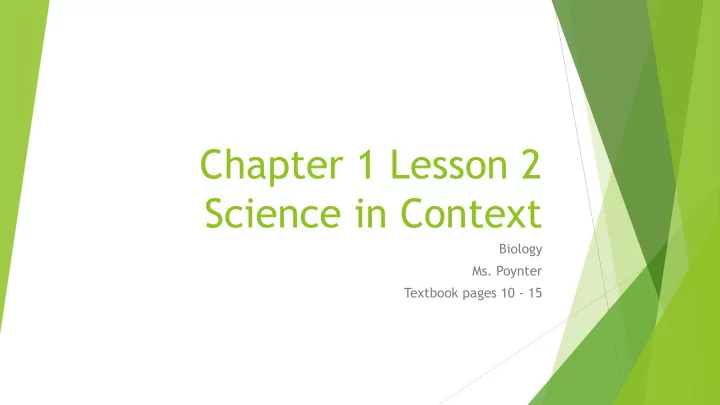

Chapter 1 Lesson 2 Science in Context Biology Ms. Poynter Textbook pages 10 - 15
Exploration and Discovery: Where Ideas Come From Scientific Attitudes: Good scientists share scientific attitudes, or habits of mind, that lead them to exploration and discovery. Curiosity: Ask questions that spark curiosity and lead to new questions. Skepticism: Question existing ideas and hypotheses; refuse to accept explanations without evidence. Open-Mindedness: Remain willing to accept different ideas that may not agree with their hypotheses. Creativity: Think creatively to design experiments that yield accurate data.
Exploration and Discovery: Where Ideas Come From Practical Problems Sometimes ideas for scientific investigations arise from practical problems. Practical problems inspire scientific questions, hypotheses, and experimentation.
Exploration and Discovery: Where Ideas Come From Practical Problems Sometimes ideas for scientific investigations arise from practical problems. Practical problems inspire scientific questions, hypotheses, and experimentation. Ex: Building in environmentally sensitive areas like sea turtle nesting habitat.
Exploration and Discovery: Where Ideas Come From Practical Problems Sometimes ideas for scientific investigations arise from practical problems. Practical problems inspire scientific questions, hypotheses, and experimentation. Ex: How can we control mosquito populations to prevent the spread of disease?
Exploration and Discovery: Where Ideas Come From Practical Problems Sometimes ideas for scientific investigations arise from practical problems. Practical problems inspire scientific questions, hypotheses, and experimentation. Ex: How can we modify food systems to produce the most amount of food in the least amount of space to accommodate the growing human population?
Exploration and Discovery: Where Ideas Come From The Role of Technology Discoveries in the field of science can lead to new technologies. New technologies can help scientists learn more and lead to new discoveries.
Communicating Results: Reviewing and Sharing Ideas Peer Review In peer review, scientific papers are reviewed by anonymous, independent experts. Publishing peer-reviewed articles in scientific journals allows researchers to share ideas and to test and evaluate each other’s work. These articles are like high powered versions of lab reports. Peer review makes the information more credible.
Communicating Results: Reviewing and Sharing Ideas Sharing Knowledge and New Ideas Once research has been published, it enters the scientific “marketplace” where it is discussed, feedback is given, and results are replicated.
Scientific Theories What is a scientific theory? In science, the word theory applies to a well-tested explanation that unifies a broad range of observations and hypotheses. They allow scientists to make accurate predictions about new situations. A useful theory that has been thoroughly tested and supported by many lines of evidence may become the dominant view among the majority of scientists, but no theory is considered absolute truth. Science is always changing; as new evidence is uncovered, a theory may be revised or replaced by a more useful explanation.
Scientific Theories A scientific theory an explanation of some aspect of the natural world. have been repeatedly confirmed through observation and experiment. are not "guesses" but reliable accounts of the real world.
Scientific Laws Statement about how things work in nature or the universe. A description of an observed phenomenon. It doesn't explain why the phenomenon exists or what causes it. The explanation of the phenomenon is a scientific theory. It is a misconception that theories turn into laws with enough research. Laws are descriptions — often mathematical descriptions — of natural phenomenon. EXAMPLES: Newton’s Law of Gravity or Law of Conservation of Energy (energy can neither be created nor destroyed, rather it transforms from one form into another). These laws simply describe the observation. Not how or why they work
Scientific Theories vs. Laws
Science and Society Science, Ethics, and Morality Scientists are expected to act both ethically and morally when conducting research. However, pure science does not include ethical or moral viewpoints. Science can explain what life is, how life operates, and how life changes over time. Science cannot answer questions about why life exists or what the meaning of life is. This is a limitation of science.
Science and Society Avoiding Bias A bias is a particular preference or point of view that is personal, rather than scientific. Examples include personal tastes, preferences for someone or something, and societal standards of beauty. Science aims to be objective, but scientists are human. Sometimes bias can cause data to be misinterpreted or misapplied.
Science and Society Understanding and Using Science Science will keep changing as long as humans keep wondering about nature. If you learn to think as scientists think, you will understand the process of science and be comfortable in a world that will keep changing throughout your life.
Recommend
More recommend